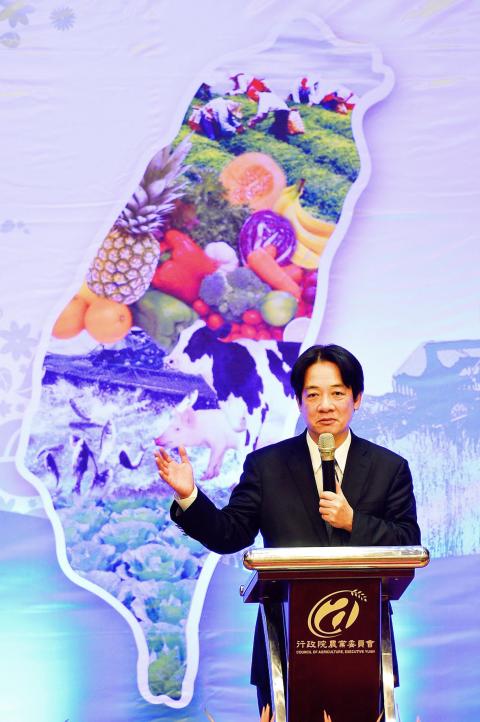Following an online petition urging the government to punish drunk drivers, sex offenders and child abusers by caning, Premier William Lai (賴清德) yesterday said that Taiwanese society would have reservations about the potential human rights violations.
The petition, submitted to a government-funded policy discussion platform on Oct. 23, calls for the government to impose flogging as an additional punishment for drunk driving, sex offenses and violence against children.
With the petition being endorsed by 26,771 netizens, far exceeding the 5,000-signature threshold that requires an official reply from the government, Minister Without Portfolio Audrey Tang (唐鳳) is to preside over a public hearing to discuss the proposal on Dec. 1.

Photo: George Tsorng, Taipei Times
Although current sentiment might favor “a strict penal code in a time of turbulence,” Taiwan is a democratic and law-abiding nation where human rights are valued, Lai said, calling for a more in-depth discussion of the issue.
“A majority of the population will likely have reservations about adopting caning like in Singapore,” Lai said, without revealing his position on the issue.
Tang said the hearing would provide an opportunity to discuss the effectiveness of flogging as a punishment and the possible human rights violations it would entail, as well as its appropriateness for Taiwanese society and alternative methods to prevent crime.
No policy would be formed during the discussion, Tang added.
Asked whether the government should reject the proposal outright instead of convening a hearing over a proposal that apparently runs counter to international human rights covenants, she said that the government should not reject a petition simply because of its provocativeness.
“The person who submitted the petition said he proposed flogging because he believes the Criminal Code is ineffective in preventing those crimes and he hopes to raise public awareness about them, but he is not adamant about flogging,” Tang said.
Many petitions submitted on the platform have proposed seemingly difficult solutions to social situations that would require government efforts, and the government should understand the purpose of such petitions, if not the proposed solutions, she said.
Tang refused to express her stance on the issue, saying that she has to remain neutral as a government official and that her duty is to collect public opinion and possible solutions to facilitate the government’s decisionmaking.

CRITICAL MOVE: TSMC’s plan to invest another US$100 billion in US chipmaking would boost Taiwan’s competitive edge in the global market, the premier said The government would ensure that the most advanced chipmaking technology stays in Taiwan while assisting Taiwan Semiconductor Manufacturing Co (TSMC, 台積電) in investing overseas, the Presidential Office said yesterday. The statement follows a joint announcement by the world’s largest contract chipmaker and US President Donald Trump on Monday that TSMC would invest an additional US$100 billion over the next four years to expand its semiconductor manufacturing operations in the US, which would include construction of three new chip fabrication plants, two advanced packaging facilities, and a research and development center. The government knew about the deal in advance and would assist, Presidential

‘DANGEROUS GAME’: Legislative Yuan budget cuts have already become a point of discussion for Democrats and Republicans in Washington, Elbridge Colby said Taiwan’s fall to China “would be a disaster for American interests” and Taipei must raise defense spending to deter Beijing, US President Donald Trump’s pick to lead Pentagon policy, Elbridge Colby, said on Tuesday during his US Senate confirmation hearing. The nominee for US undersecretary of defense for policy told the Armed Services Committee that Washington needs to motivate Taiwan to avoid a conflict with China and that he is “profoundly disturbed” about its perceived reluctance to raise defense spending closer to 10 percent of GDP. Colby, a China hawk who also served in the Pentagon in Trump’s first team,

SEPARATE: The MAC rebutted Beijing’s claim that Taiwan is China’s province, asserting that UN Resolution 2758 neither mentions Taiwan nor grants the PRC authority over it The “status quo” of democratic Taiwan and autocratic China not belonging to each other has long been recognized by the international community, the Mainland Affairs Council (MAC) said yesterday in its rebuttal of Beijing’s claim that Taiwan can only be represented in the UN as “Taiwan, Province of China.” Chinese Minister of Foreign Affairs Wang Yi (王毅) yesterday at a news conference of the third session at the 14th National People’s Congress said that Taiwan can only be referred to as “Taiwan, Province of China” at the UN. Taiwan is an inseparable part of Chinese territory, which is not only history but

INVESTMENT WATCH: The US activity would not affect the firm’s investment in Taiwan, where 11 production lines would likely be completed this year, C.C. Wei said Investments by Taiwan Semiconductor Manufacturing Co (TSMC, 台積電) in the US should not be a cause for concern, but rather seen as the moment that the company and Taiwan stepped into the global spotlight, President William Lai (賴清德) told a news conference at the Presidential Office in Taipei yesterday alongside TSMC chairman and chief executive officer C.C. Wei (魏哲家). Wei and US President Donald Trump in Washington on Monday announced plans to invest US$100 billion in the US to build three advanced foundries, two packaging plants, and a research and development center, after Trump threatened to slap tariffs on chips made